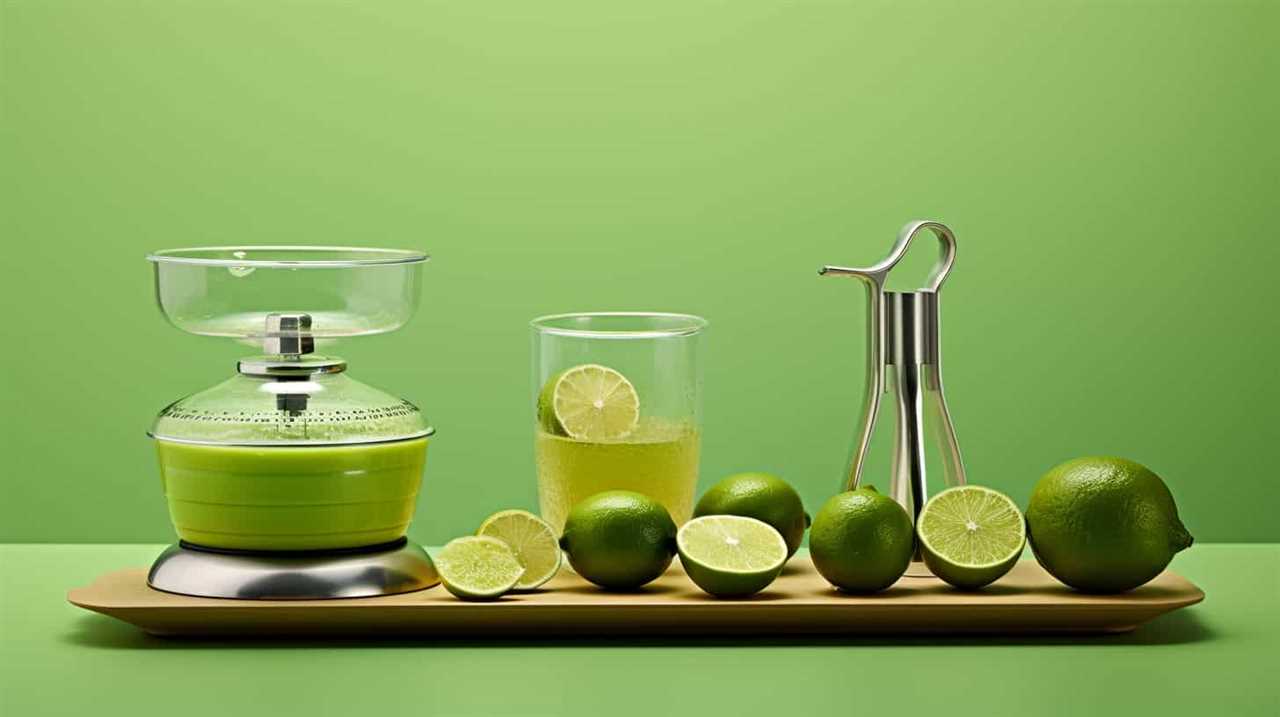We have discovered the secret to successful juicing: the top 10 vegetables that will transform your health and increase your energy levels.
Carrots, spinach, kale, celery, cucumber, broccoli, bell peppers, tomatoes, and ginger – these powerhouses are packed with essential nutrients and antioxidants.
By incorporating these vibrant veggies into your juicing routine, you’ll unleash a world of flavors and reap the incredible benefits of a nutrient-dense diet.
Get ready to serve yourself the gift of wellness with these juicing superheroes.
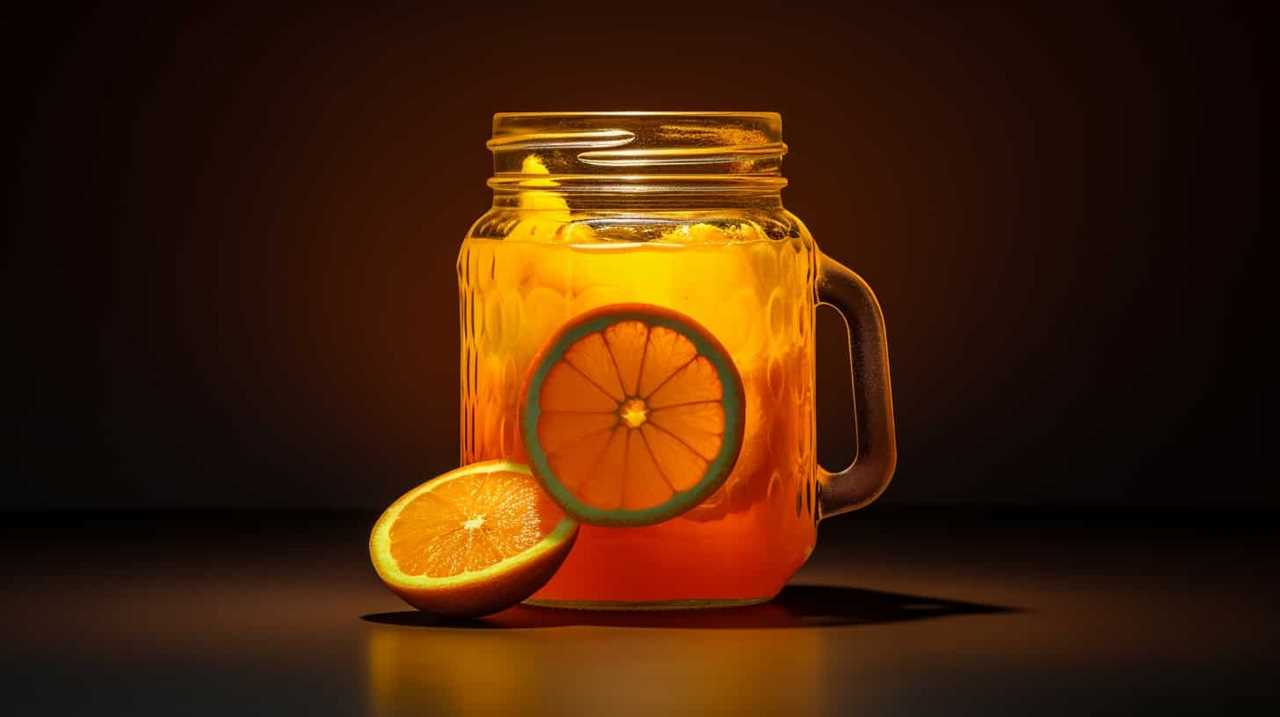
Key Takeaways
- Spinach, kale, broccoli, celery, and cucumber are excellent choices for juicing due to their high nutrient content and hydrating properties.
- Carrots and bell peppers are great additions to juicing as they provide antioxidants and essential vitamins.
- Beetroot and tomatoes are beneficial for juicing as they support heart health, fight inflammation, and provide antioxidants.
- Ginger is a powerful ingredient for juicing as it aids in digestion, boosts the immune system, and has anti-inflammatory properties.
Carrots
Why are carrots an essential vegetable for juicing success?
We love using carrots in our juicing recipes because they’re packed with nutrients and add a delicious sweetness to the mix. Carrots are rich in beta-carotene, which is converted into vitamin A in our bodies and plays a crucial role in maintaining good vision, a healthy immune system, and radiant skin.
Additionally, carrots are an excellent source of antioxidants, which help protect our cells from damage caused by harmful free radicals. When it comes to juicing, carrots are versatile and can be easily combined with other fruits and vegetables to create a refreshing and nutritious drink.
To get the most out of your carrot juice, try using the best juicing techniques like cold-pressing or blending for optimal nutrient extraction.

As we move on to discuss spinach, you’ll discover even more incredible benefits of incorporating this leafy green into your juicing routine.
Spinach
We all know that spinach is a nutritional powerhouse, packed with vitamins, minerals, and antioxidants.
But did you know that it’s also an excellent vegetable for juicing?
Spinach blends well with other fruits and vegetables, making it a versatile ingredient for creating delicious and healthy juice recipes.

In addition, spinach can be stored in the refrigerator for up to a week, making it convenient for juicing on a regular basis.
Nutritional Benefits of Spinach
Spinach is a nutrient-rich leafy green vegetable that offers numerous health benefits. Incorporating spinach into your diet can be a great way to boost your overall nutrition and improve your juicing routine. Here are some of the best ways to incorporate spinach into your diet and the health benefits of adding it to your juicing routine:
| Spinach Recipes | Health Benefits |
|---|---|
| Spinach and Berry Smoothie | Rich in antioxidants, vitamins, and minerals. Helps improve digestion and immune system. |
| Spinach Salad with Lemon Dressing | High in fiber, iron, and calcium. Supports bone health and aids in weight management. |
| Spinach and Mushroom Omelette | Packed with protein, folate, and vitamin K. Promotes heart health and supports brain function. |
Including spinach in your juicing routine can provide a concentrated source of nutrients and promote overall wellness. So, give these spinach recipes a try and enjoy the many health benefits it has to offer.
Best Juicing Recipes for Spinach
One of our favorite juicing recipes that incorporates spinach is a refreshing green smoothie.

Spinach is an excellent addition to your juicing routine because it’s packed with nutrients that promote overall health and well-being. Juicing spinach allows you to easily consume its vitamins, minerals, and antioxidants, which can support a healthy immune system and aid in detoxification.
To make this green smoothie, simply blend together a handful of spinach leaves, a ripe banana, a cup of pineapple chunks, a tablespoon of chia seeds, and a cup of coconut water.
This recipe provides a perfect balance of flavors and textures, while also delivering a powerful dose of nutrients. Remember to adjust the ingredients to suit your taste preferences and enjoy the juicing benefits that spinach has to offer.
Tips for Storing Spinach
To ensure the freshness and longevity of spinach, it’s important to properly store it using a quantifier determiner such as ‘a’ or ‘an’. Here are some tips for handling and storing spinach:
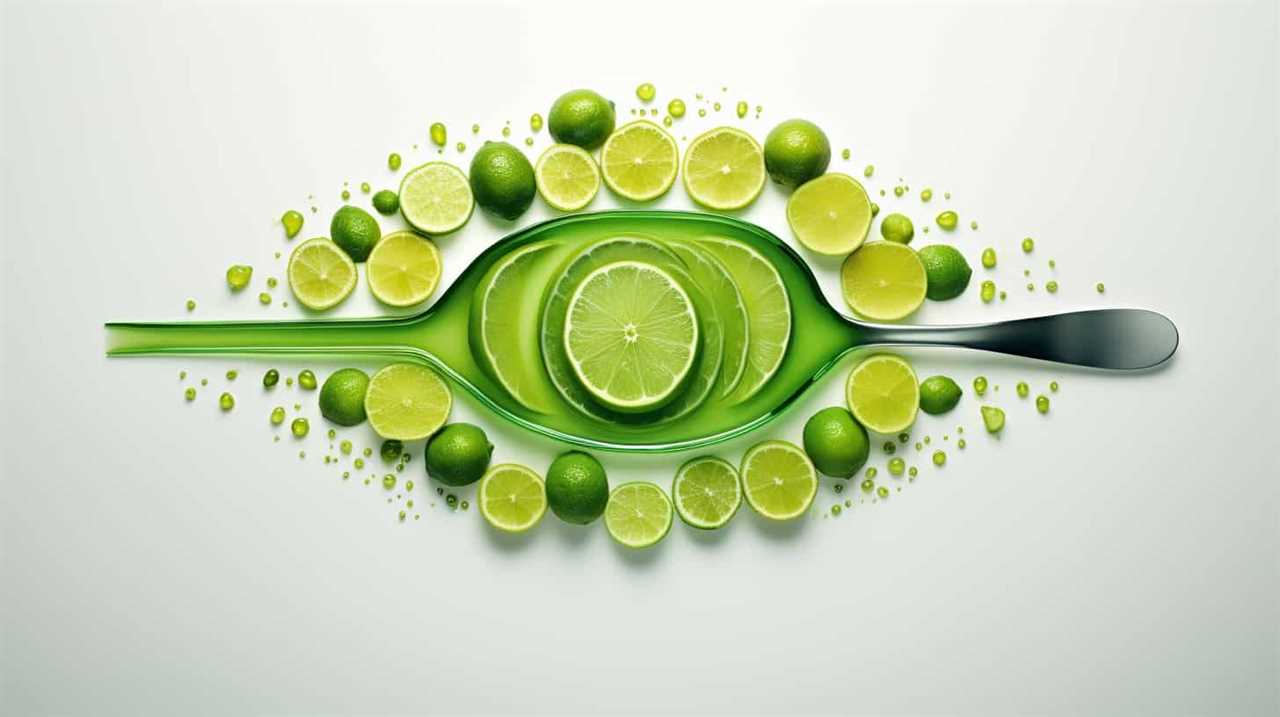
- Washing: Before storing spinach, make sure to wash it thoroughly to remove any dirt or debris. Use cold water and gently swish the leaves to clean them.
- Drying: After washing, it’s crucial to dry the spinach properly. Excess moisture can lead to spoilage. Use a salad spinner or pat the leaves dry with a clean kitchen towel.
- Storage: Place the spinach in an airtight container or a resealable plastic bag. Squeeze out as much air as possible to prevent wilting and spoilage.
- Refrigeration: Store the spinach in the refrigerator at a temperature between 35°F and 40°F (1.7°C and 4.4°C). It’s best to consume it within 3-5 days for optimal freshness.
Kale
Kale is a nutrient powerhouse and an excellent addition to any juicing routine. Packed with vitamins A, C, and K, as well as minerals like potassium and calcium, kale provides a wide range of health benefits. Whether you’re looking to boost your immune system, improve digestion, or promote healthy skin, incorporating kale into your juicing recipes is a smart choice.
Nutritional Value of Kale
Our research shows that Kale’s nutritional value is highly regarded by health enthusiasts. Kale is often referred to as a superfood due to its many nutritional benefits. It’s packed with vitamins and minerals, making it an excellent addition to any diet.
One cup of raw kale contains over 100% of the recommended daily intake of vitamin A, C, and K. It’s also a good source of calcium, iron, and antioxidants. Kale has been linked to numerous health benefits, including improved digestion, reduced inflammation, and enhanced heart health. It’s low in calories and high in fiber, making it a great option for weight management.
Incorporating kale into your diet can contribute to overall wellness and provide valuable nutrients to support your body’s needs.
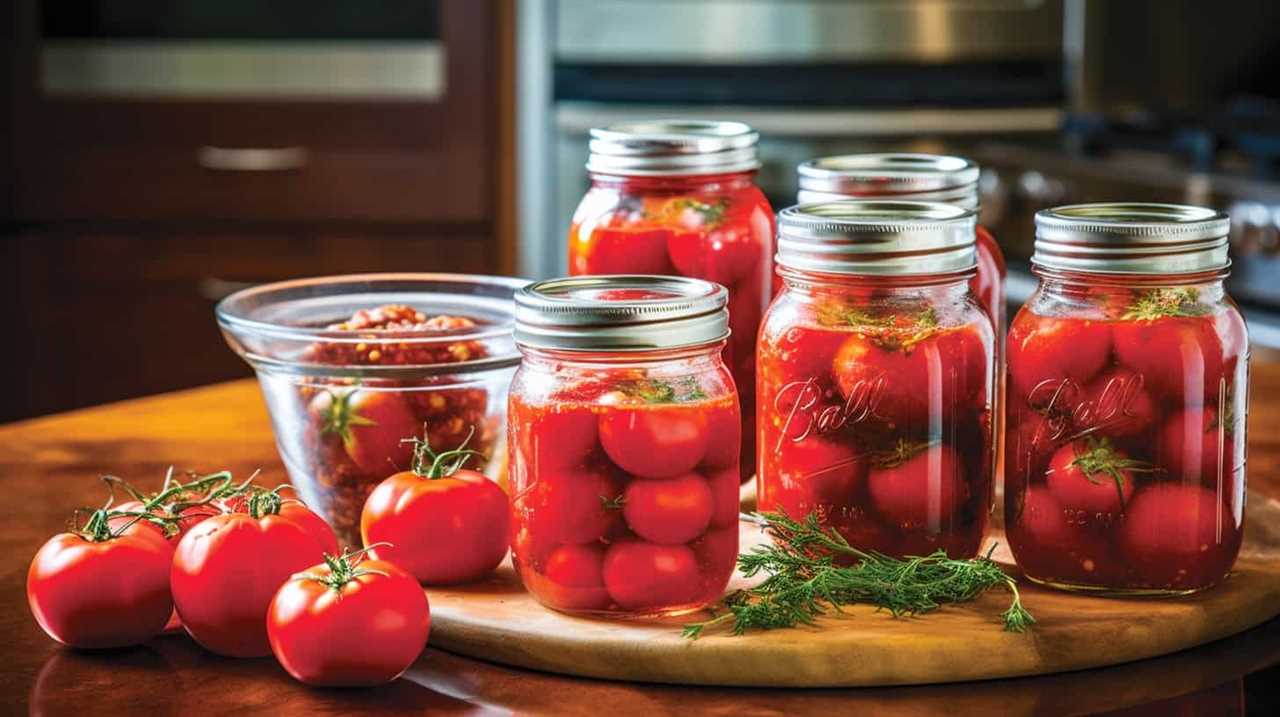
Best Juicing Recipes
Let’s dive into some delicious juicing recipes that incorporate the nutritional powerhouse of kale.
Kale is an excellent vegetable to use in juicing because of its numerous health benefits. It’s packed with vitamins A, C, and K, as well as minerals like calcium and iron. When juiced, kale can help support a healthy immune system, promote detoxification, and improve digestion.
One of the best juicing recipes that includes kale is the Green Goddess Juice. To make this refreshing drink, simply combine kale, cucumber, celery, green apple, lemon, and ginger in a juicer.
Another popular recipe is the Kale and Pineapple Blast, which combines kale, pineapple, cucumber, and mint leaves.
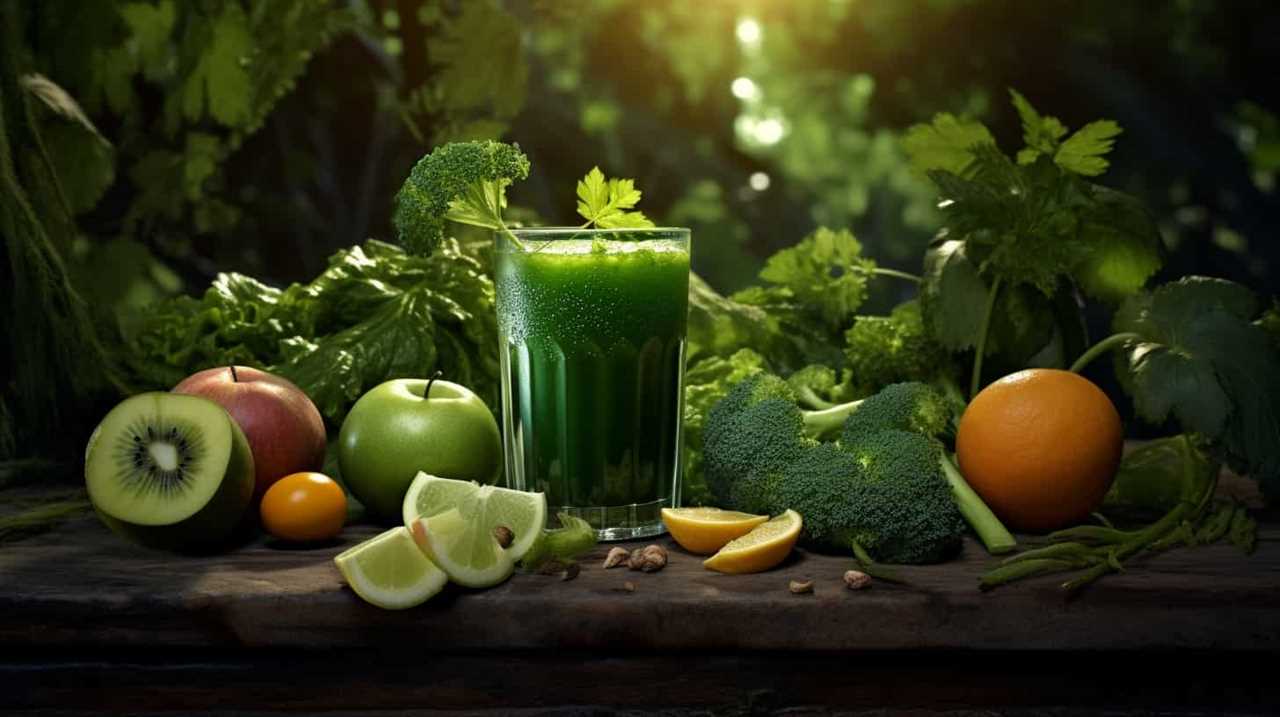
These recipes not only taste great but also provide a powerful boost of nutrients to support your overall health.
Celery
When it comes to juicing success, one vegetable that can’t be overlooked is celery. Celery isn’t only low in calories but also packed with nutritional benefits that make it an excellent addition to your juicing routine.
This versatile vegetable is rich in vitamins and minerals, including vitamin K, vitamin C, potassium, and folate. It’s also a great source of antioxidants and fiber, which can aid in digestion and help maintain a healthy weight.
Juicing celery is a popular choice due to its refreshing and mild flavor. To get the most out of your celery juice, it’s recommended to use a slow juicer to extract the maximum amount of nutrients. Additionally, combining celery with other fruits and vegetables can create delicious and nutritious juice blends.

Cucumber
Continuing the discussion on vegetables ideal for juicing success, one can’t overlook the benefits of incorporating cucumber into your juicing routine. Cucumbers aren’t only refreshing and hydrating, but they also offer a range of nutritional benefits that can support your overall health.
Here are some key reasons why you should consider adding cucumber to your juicing recipes:
- Hydration: Cucumbers are made up of about 96% water, making them an excellent choice for staying hydrated.
- Antioxidants: Cucumbers are rich in antioxidants such as vitamin C, beta-carotene, and manganese, which help protect your cells from damage.
- Digestive health: The high water and fiber content in cucumbers can help support a healthy digestive system.
- Skin health: Cucumbers contain silica, a mineral that promotes healthy skin by boosting collagen production.
Incorporating cucumber into your juicing routine can be a simple and effective way to reap these nutritional benefits while enjoying a refreshing and delicious beverage.
Beetroot
Moving on to the next vegetable in our discussion of vegetables ideal for juicing success, we can’t overlook the incredible benefits of incorporating beetroot into our juicing routine.

Beetroot is a versatile and nutrient-packed vegetable that can add a vibrant color and delicious flavor to your juice. Not only does it taste great, but it also offers a range of health benefits.
Beetroot is rich in antioxidants, which can help fight inflammation and protect against chronic diseases. It’s also a great source of fiber, which aids in digestion and promotes a healthy gut. Additionally, beetroot is known to support cardiovascular health, boost stamina, and improve blood pressure.
To get the most out of beetroot, try experimenting with different beetroot recipes and combinations in your juicing routine.
Broccoli
For our next vegetable in the discussion of vegetables ideal for juicing success, let’s explore the benefits of incorporating broccoli into our juicing routine.
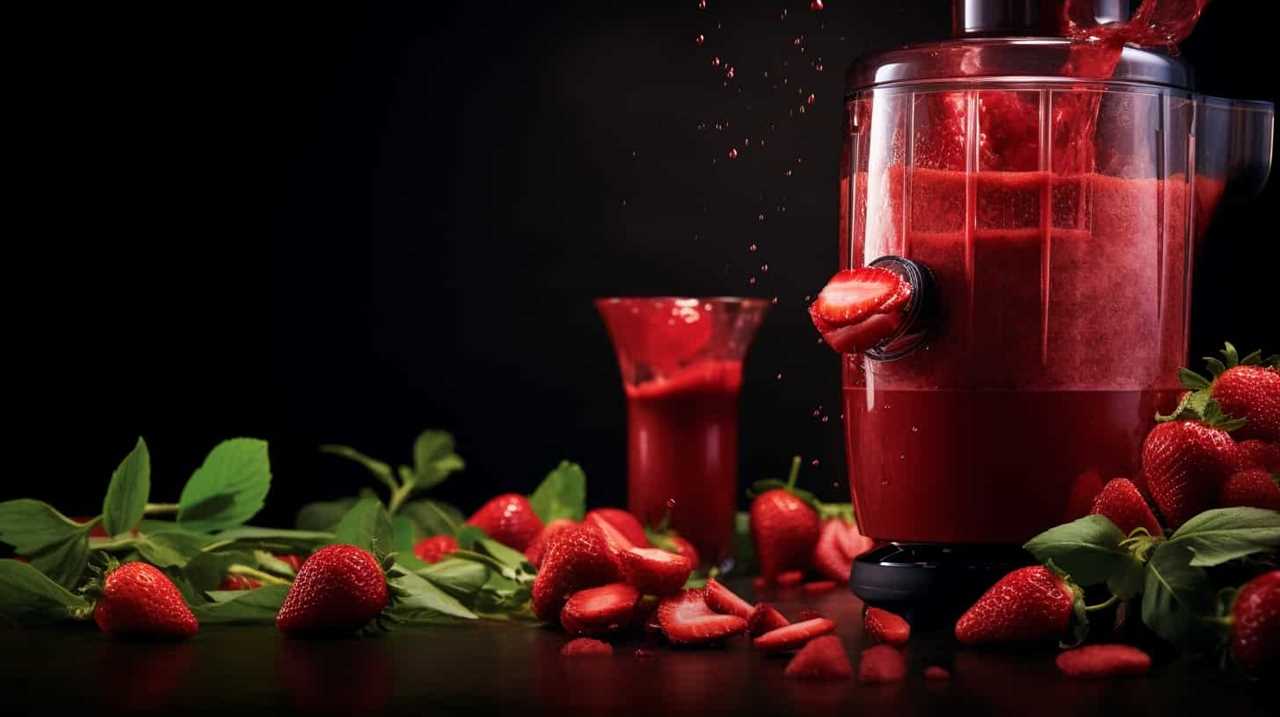
Broccoli isn’t only a versatile vegetable that can be enjoyed in various dishes, but it’s also packed with nutrients that can boost our overall health. Here are some reasons why broccoli is a great addition to our juicing repertoire:
- Rich in vitamins and minerals: Broccoli is a powerhouse of essential nutrients such as vitamin C, vitamin K, and folate, which are important for our immune system, bone health, and cell function.
- Supports digestion: Broccoli contains fiber that aids in digestion and promotes a healthy gut.
- Cancer-fighting properties: Studies have shown that the compounds found in broccoli can help reduce the risk of certain cancers, including breast, prostate, and colon cancer.
- Versatile cooking methods: Whether steamed, roasted, or stir-fried, broccoli can be prepared in various ways to suit our taste preferences and retain its nutritional value.
Now that we understand the benefits of incorporating broccoli into our juicing routine, let’s move on to the next vegetable on our list: bell peppers.
Bell Peppers
Bell peppers are a fantastic addition to any juicing routine due to their numerous nutritional benefits. Packed with vitamins A and C, bell peppers can help boost your immune system and promote healthy skin.
They also offer a delightful flavor that pairs well with a variety of other fruits and vegetables, allowing for endless combinations in your juicing recipes. Some of the **top vegetables for juicing** that complement these flavors include kale, carrots, and spinach, all of which provide a nutritious and well-balanced beverage. The versatility of these combinations not only enhances the taste but also maximizes the nutritional benefits from your juice. Experimenting with different fruits and vegetables can lead to discovering new favorite blends that suit your taste and health goals.

Nutritional Benefits of Bell Peppers
One of the top 10 vegetables we recommend for juicing success is bell peppers because they offer numerous nutritional benefits. Bell peppers aren’t only colorful and delicious but also packed with essential vitamins and minerals.
Here are some of the key nutritional benefits of bell peppers:
- Rich in Vitamin C: Bell peppers are an excellent source of vitamin C, which is essential for a healthy immune system.
- High in Antioxidants: These vegetables are loaded with antioxidants that help protect the body against oxidative stress and inflammation.
- Good Source of Vitamin A: Bell peppers contain vitamin A, which is important for maintaining healthy skin and vision.
- Low in Calories: Bell peppers are low in calories but high in nutrients, making them a great addition to any weight loss or healthy eating plan.
Incorporating bell peppers into your diet is easy! You can add them to salads, stir-fries, or even enjoy them raw as a snack. Their versatility and nutritional benefits make them a must-have vegetable for juicing success.
Delicious Flavor Combinations
Now let’s explore the delicious flavor combinations that can be created with bell peppers.

Bell peppers, with their vibrant colors and crisp texture, are versatile vegetables that can be paired with a variety of ingredients to create flavorful pairings.
One unique combination is to combine bell peppers with tomatoes and cucumber for a refreshing and tangy juice. The sweetness of the bell peppers complements the acidity of the tomatoes, while the cucumber adds a cool and refreshing element.
Another delicious option is to combine bell peppers with carrots and ginger for a zesty and invigorating juice. The natural sweetness of the carrots pairs well with the slight heat of the ginger, while the bell peppers add a subtle depth of flavor.
These flavorful pairings showcase the versatility of bell peppers and can provide a unique twist to your juicing experience.

Versatility in Juicing Recipes
When it comes to juicing recipes, bell peppers offer a versatility that enhances the overall flavor and nutritional value of any juice blend. These vibrant vegetables can be easily incorporated into various recipes, allowing you to create flavorful combinations that will satisfy your taste buds and provide numerous health benefits.
Here are some reasons why bell peppers are an excellent addition to your juicing routine:
- They come in different colors, such as red, yellow, and green, each offering a unique taste and nutritional profile.
- Bell peppers are packed with essential vitamins and minerals, including vitamin C, vitamin A, and potassium.
- They add a refreshing and slightly sweet taste to your juices, complementing other ingredients perfectly.
- Bell peppers can be easily mixed with fruits, leafy greens, and herbs, providing endless possibilities for creating delicious and nutritious juice blends.
Incorporating bell peppers into your juicing recipes won’t only enhance the flavor but also provide a range of health benefits, making them a versatile and valuable addition to your juicing routine.
Tomatoes
The tomatoes are a versatile and nutritious vegetable that we love to include in our juicing recipes. Not only do they add a rich flavor to our juices, but they also offer several nutritional benefits. Tomatoes are packed with vitamins A and C, as well as antioxidants like lycopene, which has been linked to reducing the risk of certain cancers.

When it comes to juicing tomatoes, there are a few delicious recipes to try. One popular option is the classic tomato and cucumber juice, which combines the refreshing taste of cucumbers with the tanginess of tomatoes. Another great recipe is the tomato and carrot juice, which provides a good balance of sweetness and acidity.
Whichever recipe you choose, incorporating tomatoes into your juicing routine is a great way to boost your nutrient intake and add a delicious twist to your juices.
Ginger
As we continue exploring the top vegetables ideal for juicing success, let’s delve into the versatile root vegetable known as ginger. Ginger isn’t only a flavorful addition to your juices, but it also offers numerous health benefits. Here are some reasons why ginger should be a staple in your juicing routine:
- Ginger is known for its anti-inflammatory properties, which can help alleviate pain and reduce inflammation in the body.
- It aids in digestion by stimulating the production of digestive enzymes and increasing the absorption of nutrients.
- Ginger is a natural immune booster, thanks to its high levels of antioxidants that help fight off harmful free radicals.
- It can help relieve nausea and motion sickness, making it a great ingredient for juicing before a long journey.
Ready to incorporate ginger into your juicing routine? Try these ginger juicing recipes:

- Ginger-Apple Detox Juice
- Ginger-Carrot Energizer
- Ginger-Green Goodness
- Ginger-Beet Cleanser
Cheers to a healthier you with the power of ginger!
Frequently Asked Questions
Can I Juice the Vegetables Mentioned in the Article Using a Blender Instead of a Juicer?
Yes, we can juice the mentioned vegetables using a blender instead of a juicer. Juicing with a blender has its benefits, such as retaining more fiber. However, it may produce a thicker consistency.
Are There Any Specific Health Benefits Associated With Each Vegetable Mentioned in the Article?
There are specific health benefits associated with each vegetable mentioned in the article. Juicing with a blender is a convenient way to extract nutrients and maximize the benefits of these vegetables.
How Long Can I Store Freshly Juiced Vegetables in the Refrigerator?
To prevent spoilage, store freshly juiced vegetables in the refrigerator for up to 48 hours. Juicing offers benefits like weight loss, detoxification, energy, digestion, skin health, immune support, and nutrient absorption.

Can I Mix Different Vegetables Together to Create Unique Juice Blends?
Yes, mixing different vegetables together can create unique juice blends. It allows you to experiment with flavors and enjoy a variety of nutrients. Alternative juicing methods can also enhance the taste and health benefits of your juices.
Are There Any Precautions or Potential Side Effects to Consider When Juicing These Vegetables?
When juicing vegetables, it’s important to be aware of any precautions or potential side effects. Some vegetables may cause digestive issues or interact with medications. Consulting a healthcare professional is a wise choice.
Conclusion
In conclusion, incorporating a variety of vegetables into your juicing routine can greatly contribute to your overall health and well-being.
For example, Lisa, a busy working mother, started juicing carrots and spinach every morning. She noticed a significant boost in her energy levels throughout the day, allowing her to keep up with her demanding schedule and still have time for her family in the evenings.

Adding these nutrient-rich vegetables to your juicing repertoire can help you achieve similar benefits. Start juicing today and experience the positive impact on your health.
Susannah expertise lies in researching and compiling evidence-based content on juicing, nutrition, and overall health. She is committed to ensuring that The Juicery World offers accurate, up-to-date, and trustworthy information to empower readers to take control of their health. Susannah’s goal is to inspire individuals to embrace juicing as a way to nourish their bodies and live their best lives.












